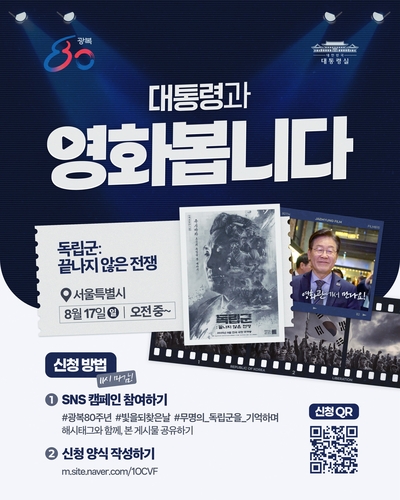Why this event matters now
The lights in the theater came back on for Liberation Day’s 80th anniversary.
On August 17, 2025, President Lee Jae‑myung joined members of the public to watch the film "Independence Army: An Unfinished War."
Officials said the president invited viewers through a social media sign‑up and then selected attendees by lottery.
The screening took place at a private location in Seoul; time and place were withheld for security reasons.
Although the notice was brief, the room felt weighty with history.
The film was reportedly recommended by actor Cho Jin‑woong, a well‑known Korean performer, which helped draw attention to the screening.
The president’s personal presence can be read as more than attendance: it was a deliberate effort to recall the meaning of Liberation Day (the Korean holiday marking freedom from Japanese colonial rule in 1945).
As a result, reactions split between seeing the event as cultural commemoration and reading it as a political signal.

"A promise to watch with the public"
The atmosphere inside was solemn but not heavy.
According to reports, the president wrote on social media that he wanted to share the meaning of Liberation Day with citizens.
This comment linked personal reflection to collective memory.
Choosing a film to mark the anniversary looked like a cultural strategy to revive public memory through emotion and story rather than a formal address.
Meanwhile, bringing historical commemoration into cultural formats follows a trend some governments use to connect with people's feelings.
Rather than an official speech, a movie can reach broader audiences and create emotional touchpoints.
However, that same emotional reach can be interpreted as political messaging, depending on context and timing.
Observers noted that how organizers balance culture and politics matters for public perception.
The ripple effect of a small screening
One modest screening sparked wider public debate.
Supporters praised the shared space where the president and citizens experienced a historical story together.
The film depicts the sacrifices and stubborn resolve of independence fighters, themes that easily resonate with audiences.
In that sense, a movie screening can act as a cultural tool to prompt historical reflection and patriotic feeling.
From an education standpoint, popular media can be an effective way to teach history.
Watching a film in a theater turns personal reaction into a shared memory, which can strengthen public understanding of past events.
The symbolism of the 80th anniversary of Liberation Day created a particularly receptive moment for that kind of collective remembering.
Also, opening sign‑ups on social media was seen as an attempt to broaden participation beyond traditional invite lists.
On the other hand, these advantages do not erase legitimate criticisms.
The lottery selection process, the secrecy about time and place, and limits on attendance raise questions about transparency and fair access.
Still, many observers agree that the event did help raise awareness of history through a cultural symbol.
Whether that awareness becomes a lasting positive effect or is overshadowed by political readings depends on how the conversation unfolds going forward.
Sharing Liberation Day in public
Critics did not hold back.
Some argued that choosing a private venue and selecting attendees by lottery created fairness issues.
They warned that limiting public involvement in an official anniversary event can favor certain groups over others.
Additionally, keeping details secret for security can be interpreted as a lack of transparency in public affairs.
Moreover, concerns about political neutrality were a central critique.
When a sitting president leads a viewing of a particular film, critics said, it can be mistaken for a political statement rather than a cultural commemoration.
If the event is seen as political theater, the cultural purpose may be obscured and public trust eroded.
Scholars and commentators pointed out that the line between culture and politics can blur easily in such settings.
Access methods also amplified discontent.
Relying on social media for sign‑ups can disadvantage people with limited digital access, while a lottery leaves many disappointed.
As a result, some citizens felt the encounter with the president was more like a publicity opportunity than an inclusive civic moment.
That perception will likely factor into planning decisions for future public events.
In response, calls grew for clearer planning and greater openness.
Organizers could restore trust simply by publishing available information and selection criteria where security considerations allow.
Ultimately, securing political neutrality and fairness for public commemorations depends on careful event design and communication.
The cultural choice the president made
In short, the event deserves a straightforward wrap‑up.
As a cultural act on the symbolic date of Liberation Day’s 80th anniversary, the screening was an attempt to revive shared memory through film.
At the same time, the lottery selection and private venue left unresolved questions about fairness and transparency.
The debate between supporters and critics will inform how similar public commemorations are organized in the future.
Ultimately, balance is the core issue.
Cultural commemorations can deepen historical awareness, but they must be paired with safeguards that protect fairness and political neutrality.
Future planners should design participation and disclosure practices with greater sensitivity to inclusion and public scrutiny.
That approach raises broader questions about how societies manage collective memory in public life.
What do readers think?
Is watching a film with the president enough to strengthen historical memory, or do such events require more openness and fairness?
That question will likely recur in public debate for some time.
On August 17, 2025, President Lee Jae‑myung joined citizens at a private screening of "Independence Army: An Unfinished War" to mark the 80th anniversary of Liberation Day (Korea’s August 15, 1945 holiday celebrating the end of Japanese rule).
The event was praised for using culture to renew historical awareness, but critics raised concerns about a lottery‑based selection and the secrecy of time and place, calling for greater transparency and neutrality in public commemorations.
Supporters highlighted the screening’s role in creating shared memory, while opponents warned of political interpretation and unequal access.
Future events should aim for broader participation and clearer disclosure to maintain trust in public remembrance.